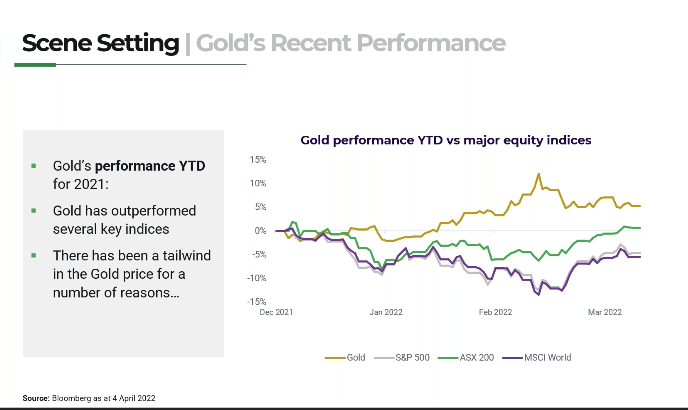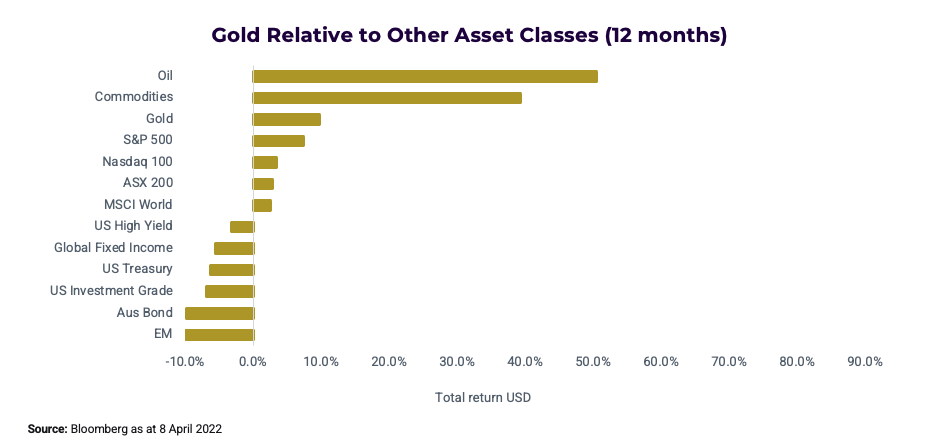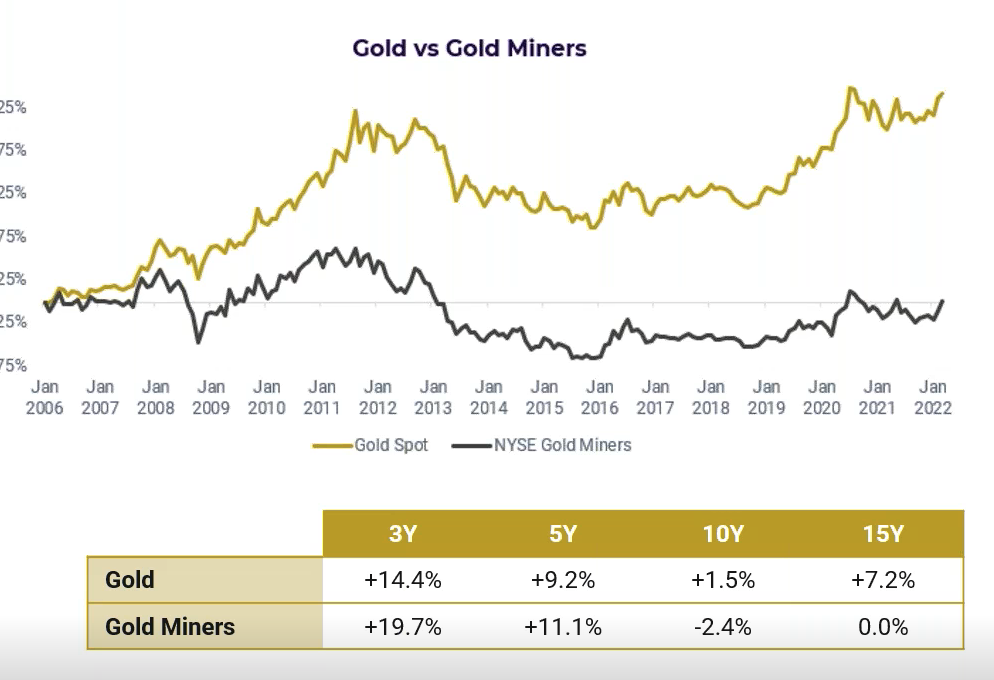Stocks versus Gold: What’s better in a crisis?
Russia’s platinum and palladium are among the latest commodities knocked by the rogue nation’s invasion of Ukraine, as the London Platinum and Palladium Market Association last week added the exports to its blacklist.
This move closely followed the London Bullion Market Association’s banning of Russian gold in March, which means no newly minted bars can be traded in one of the world’s key bullion centres.
On the back of these moves, prices for each of the metals have risen sharply. Since the announcements, the price of platinum and gold have lifted 8% and almost 6%.
This is a topic addressed in a recent webinar hosted by exchanged-traded product asset management firm ETF Securities Australia.
The gold price rose sharply in 2019 and 2020, before pulling back late last year, as the recovering global economy saw investors return to riskier assets including equities. In response, the overall 2021 gold return slumped to -3.6%, but it’s rallied again, up 5.9% in 2022 so far.
Acknowledging this volatility in gold, ETF Securities' Andrew Duncan says: “It’s hard to time when these things happen – COVID-19, Russia-Ukraine – that’s why we’re usually talking to clients about a longer-term, strategic asset allocation to the metal.”
ETF Securities’ bullish view on gold is supported by the asset's performance versus several indices.

“We’ve seen some tailwinds for gold that have negatively affected equities – the flight to safety and higher inflation,” Duncan says.
“But we’ve seen the gold price stabilise and equity markets have also bounced, having turned positive for the year in benefiting from the commodities boom.”
Why has this happened? The firmer direction from the US Fed via its rates policy, for one thing, helped markets move past the uncertainty that investors hate so much.
Looking across other indices, the precious metal has also outperformed, says Duncan. As the table below shows, gold has been the third-best asset class YTD, behind oil and the broader commodities basket.

“Gold’s price movement often has little to no statistical relationship to the S&P 500 and the ASX200 – which highlights its diversification benefits," Duncan says.
This correlation changes over time, shifting by as much as two standard deviations. (Note: Standard deviation is a measure of the amount of variation or dispersion of a set of values, the term most frequently used to help measure market volatility.)

Gold’s historical correlation is + 0.3 – which means it moves in line with a positive equity market. But when the market is down by two SDs – a market that has fallen or is still falling – the correlation turns negative.
“Gold’s relationship in this kind of market is inverse to equities, which shows its defensive characteristics in times of market stress,” says Duncan.
Examples include the late ‘90s tech crash, the global financial crisis of 2007-2008, Q4 of 2018, and the COVID-19 market downturn in March 2020.
Gold as portfolio insurance
As inflation looks set to remain higher for longer, what does this mean for gold’s role as a portfolio risk hedge?
Gold is usually inversely related to real yields – especially in recent years when inflation and interest rates have both been low.
“When nominal yields rise, it’s often assumed inflation will fall. This represents a positive movement in the real yield rate which is, generally speaking, unfavourable,” says Duncan.
“But recently we’ve seen rapidly rising inflation and heightened unexpected geopolitical risk which has offset any drag from higher nominal rates, despite the Fed’s moves.”
Zooming out to the macro level for a moment, Duncan reflects on the primary drivers of the higher inflation markets are currently absorbing:
- Ongoing logistics issues due to Covid
- Raw materials and supply constraints linked to the Russia-Ukraine crisis
- Elevated oil and gas prices
- Anticipated food – particularly grain and wheat shortages linked to the European conflict.
And on the economic policy front, we’ve seen the US Federal Reserve and Bank of England lifting interest rates – the Fed bumping rates by 25 basis points last week, the first move up since 2018. The calls of seven or eight rises – some or all possibly in 50 basis point increments – are also increasing in volume.
But in turn, argues Duncan, this should also be supportive of the price of gold. As are other potential risks on the horizon, including a hard landing for equities and the prospect of stagflation. (Note: The term “stagflation” refers to an economy that has inflation, a slow or stagnant economic growth rate, and a relatively high unemployment rate.)
How do you invest in gold?
Overall, ETF Securities' view is that, for the short to medium term, the “safe haven” virtues of Gold mean it earns a place in a portfolio – perhaps more than the riskier parts of the equity universe. But this doesn’t mean you should go all in. And as always, consult with a qualified financial adviser familiar with your personal situation before making any decisions.
Duncan points to anecdotal evidence that suggests a Gold allocation of between 2% and 5% can improve a portfolio's performance and boost risk-adjusted returns on a long-term basis.
He also addresses some of the most common criticisms levelled at Gold as an investable asset.
Why would I buy physical gold when I can buy gold mining stocks?
“It comes down to risks. With equities, you have indirect exposure alongside the risks of company fundamentals, management performance, production costs, reserve levels, exploration success, grades, hedging activities, and ESG," Duncan says.
“And when selecting individual mining stocks, while it can produce large windfalls, it presents heightened risks through stock selection.”

How do you price Gold?
In recent years, the view that rising “real yields” would mean a big hit to Gold prices hasn’t arisen. Instead, the increasing demand driven by rising inflation and, more recently, geopolitical aspects such as the war in Ukraine, has more than offset this effect.
Other ways to own gold in a portfolio:
- Exchange-traded funds.
- Bars and coins – but there are costs involved.
- Synthetic exposures – for example, Futures, warrants or other derivative structures
- Gold equities via mining stocks.
Never miss an insight
If you're not an existing Livewire subscriber you can sign up to get free access to investment ideas and strategies from Australia's leading investors.
And you can follow my profile to stay up to date with other wires as they're published – don't forget to give them a “like”.
2 topics
1 contributor mentioned

